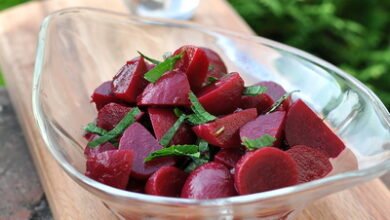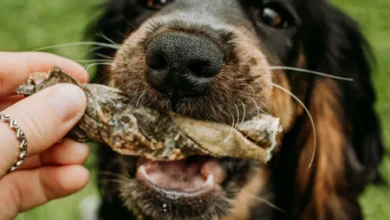
Can Dogs Eat Lemon Cake? Why Is Lemon Cake Not Dog-Friendly? Lemon cake contains ingredients like citrus, sugar, and butter that can be harmful to dogs. Dogs’ digestive systems aren’t designed to handle these ingredients, which can lead to upset stomachs and other health issues.
Though delicious for humans, lemon cake can cause discomfort and even serious health problems for dogs. It’s best to avoid sharing this treat with your pet and choose safer options instead.So, let’s explore that- Can Dogs Eat Lemon Cake?
Breaking Down the Ingredients in Lemon Cake
Whole lemon cake may be a tasty treat for humans, its ingredients can pose health risks for dogs. Understanding these ingredients can help pet owners make informed choices and keep their pets safe from potential health issues associated with such treats.
Lemon
Lemon is often used in lemon cake for its fresh, tangy flavor, but it contains citric acid and essential oils that may not sit well with dogs. These elements can irritate a dog’s digestive system, leading to an upset stomach or even more serious symptoms.
- Citric acid: This can cause gastrointestinal distress, leading to vomiting or diarrhea.
- Essential oils: The oils in lemon can be too harsh for a dog’s stomach and liver.
- Bitter taste: Dogs may not enjoy the bitterness of lemon, which can make them reluctant to eat it.
Sugar
Lemon cake is high in sugar, which is not only unnecessary in a dog’s diet but can also cause various health problems over time. High sugar intake can contribute to obesity and dental issues and may even increase the risk of diabetes.
- Weight gain: Excessive sugar contributes to unnecessary weight gain, putting strain on joints and overall health.
- Tooth decay: Sugar can lead to plaque buildup and cavities, similar to how it affects human teeth.
- Blood sugar spikes: Sugary treats can cause a quick spike in blood sugar levels, which may be dangerous, especially for dogs prone to diabetes.
Butter and Oil
Lemon cake typically includes butter and oil, adding richness but also a high fat content. Consuming these ingredients can pose significant risks to dogs, particularly if they’re prone to digestive issues or obesity.
- High fat: Fatty foods can cause inflammation of the pancreas, leading to pancreatitis, a painful and serious condition.
- Risk of obesity: Frequent consumption of high-fat treats can contribute to weight gain, especially in less active dogs.
- Digestive upset: Fat-rich foods are harder for dogs to digest, which can lead to vomiting, diarrhea, or stomach discomfort.
By understanding the components of lemon cake, pet owners can see why it’s best to avoid giving this treat to their dogs. Opting for dog-safe alternatives instead can satisfy a dog’s taste buds without the risks associated with sugar, fat, and citrus acids.
How Lemon Cake Can Affect Your Dog’s Health
Lemon cake might seem harmless, but it contains ingredients that can lead to health issues in dogs. From digestive problems to serious conditions like pancreatitis, feeding lemon cake to your dog poses various risks. Here’s a breakdown of how lemon cake can affect your dog’s well-being.
Digestive Problems
The acidity in lemon and the high fat content in butter and oils can irritate your dog’s digestive system, leading to uncomfortable symptoms.
- Vomiting and Diarrhea: Citric acid from the lemon can upset a dog’s stomach, leading to nausea, vomiting, and diarrhea.
- Stomach Discomfort: The combination of rich ingredients can lead to gas, bloating, and stomach pain, especially in dogs with sensitive stomachs.
- Lethargy: When a dog’s digestive system is in distress, they may become less active or tired as their body works to process the ingredients.
Increased Risk of Obesity
Sugary and high-fat treats like lemon cake can contribute to weight gain, leading to additional health problems down the line.
- Weight Gain: The sugar and fat in lemon cake add unnecessary calories to a dog’s diet, promoting weight gain if given regularly.
- Joint Strain: Extra weight can put pressure on a dog’s joints, leading to discomfort and increased risk of arthritis.
- Reduced Mobility: Over time, obesity can decrease a dog’s ability to exercise, which may further impact their overall health and happiness.
Pancreatitis
One of the most serious risks associated with fatty foods like lemon cake is pancreatitis, an inflammation of the pancreas that can be painful and even life-threatening.
- High-Fat Content: Butter and oils can overwhelm a dog’s digestive system, especially in breeds prone to pancreatitis.
- Symptoms of Pancreatitis: Dogs with pancreatitis may experience severe abdominal pain, vomiting, and a lack of appetite.
- Risk for Recurrence: Once a dog develops pancreatitis, they may be more susceptible to future episodes, which is why it’s best to avoid fatty foods entirely.
In short, while lemon cake may be a tempting treat to share, its potential risks far outweigh any momentary pleasure for your dog. Instead, opt for dog-friendly snacks that can satisfy their cravings without compromising their health.
What to Do If Your Dog Eats Lemon Cake
If your dog has eaten lemon cake, it’s important to take a few quick steps to minimize any potential health risks. Lemon cake contains ingredients that could upset your dog’s digestive system or cause more serious health issues. Here’s a guide on what to do next.
Monitor for Symptoms
Keep a close eye on your dog after they’ve eaten lemon cake, as signs of an upset stomach may develop.
- Watch for Vomiting or Diarrhea: Citric acid and fat can cause digestive issues, so check for any signs of vomiting or loose stools.
- Observe Behavior: Look for unusual behaviors like pacing, whining, or lack of energy, which could indicate discomfort.
- Check for Nausea: Lip licking, drooling, or refusing food can be signs your dog is feeling nauseated.
Provide Fresh Water
Hydration is essential for helping your dog’s system handle potentially upsetting ingredients.
- Keep Water Accessible: Make sure your dog has plenty of fresh water to help with digestion and hydration.
- Encourage Drinking: Drinking water can help flush out the ingredients and minimize irritation in your dog’s stomach.
Call the Vet
If symptoms persist or if your dog has consumed a large amount of lemon cake, it’s best to consult a veterinarian.
- Seek Professional Advice: Contact your vet if your dog shows severe symptoms like vomiting, lethargy, or abdominal pain.
- Bring Details: When speaking with your vet, provide details like the amount of cake eaten and your dog’s size, as this helps the vet assess any risks.
- Follow Instructions: Your vet may recommend monitoring at home or bringing your dog in for a check-up, depending on the severity of the symptoms.
Monitoring your dog’s behavior, keeping them hydrated, and consulting your vet if necessary can help ensure your dog stays safe after eating lemon cake. For future snacks, consider dog-friendly treats that won’t put their health at risk.
Safer Treat Alternatives for Dogs
If you’re looking for healthier snack options for your dog, there are plenty of treats that offer nutritional benefits without the risks associated with human desserts like lemon cake. Here are some dog-friendly alternatives that are safe, tasty, and nutritious.
Carrot Sticks
Carrots are a fantastic, low-calorie snack that most dogs enjoy.
- Dental Health: Crunchy carrots can help clean your dog’s teeth and reduce plaque buildup.
- Digestive Benefits: Carrots are high in fiber, which supports a healthy digestive system.
- Vitamin-Rich: Carrots are loaded with vitamins like beta-carotene, which promotes eye health.
Frozen Blueberries
Blueberries are a nutritious, antioxidant-rich snack that’s perfect for dogs.
- Low in Sugar: Unlike many fruits, blueberries are low in natural sugars, making them a great low-calorie treat.
- Antioxidant Benefits: Packed with antioxidants, blueberries help support a healthy immune system.
- Easy to Serve: Simply freeze fresh blueberries for a cool, refreshing snack your dog will love.
Pumpkin Puree
Pumpkin is gentle on your dog’s stomach and packed with beneficial nutrients.
- Fiber-Rich: Pumpkin can help regulate your dog’s digestion, making it especially helpful for dogs with sensitive stomachs.
- Nutrient Dense: Pumpkin is rich in vitamins A, C, and E, which promote skin, eye, and immune health.
- Simple Preparation: Use plain, unsweetened pumpkin puree for a nutritious treat or add a spoonful to your dog’s regular food.
These alternatives are not only safe but also contribute positively to your dog’s health, making snack time enjoyable without the risks associated with sugary, high-fat treats.
The Importance of Choosing Dog-Safe Treats
When it comes to treating your dog, choosing snacks that are specifically formulated for their health is essential. Unlike human treats, which often contain ingredients that can upset a dog’s stomach or even pose serious health risks, dog-friendly treats are designed to meet your pet’s unique dietary needs. Here’s why selecting safe, wholesome treats is crucial for your dog’s well-being.
Why Dog-Safe Treats Matter
Dogs have different nutritional needs than humans, and not all human foods are safe for them. Human cakes and sweets, for instance, are often high in sugar and fat, which can lead to a host of health issues.
- Tailored to Their Digestion: Dogs digest certain foods differently than humans. Ingredients like chocolate, raisins, and excessive fats, common in human sweets, can be toxic to dogs.
- Supports Overall Health: Treats made for dogs contain nutrients that support their health, from strong bones to a shiny coat, without unnecessary sugar or unhealthy fats.
Benefits of Wholesome, Dog-Friendly Ingredients
When you opt for treats with simple, nutritious ingredients, you’re helping to ensure your dog’s long-term health and happiness.
- Low Sugar, Low Fat: Look for treats with minimal sugar and fat to avoid health risks like obesity and diabetes.
- Added Nutrients: Many dog-safe treats include beneficial ingredients like fiber for digestion, antioxidants for immunity, and omega-3s for coat health.
Tips for Choosing the Right Treats
Knowing what to look for can make it easier to find the right snacks for your pet.
- Read the Labels: Check ingredients to make sure they’re safe, avoiding artificial additives or high sugar content.
- Go Natural: Treats with natural ingredients, like sweet potatoes or apple slices, are often healthier and easier on your dog’s digestion.
- Moderation is Key: Even with dog-safe treats, keep portions reasonable to prevent overeating.
Choosing the right treats not only satisfies your dog’s taste buds but also promotes a happy, healthy life. Treat them to wholesome, dog-approved snacks, and they’ll thank you with endless tail wags!




